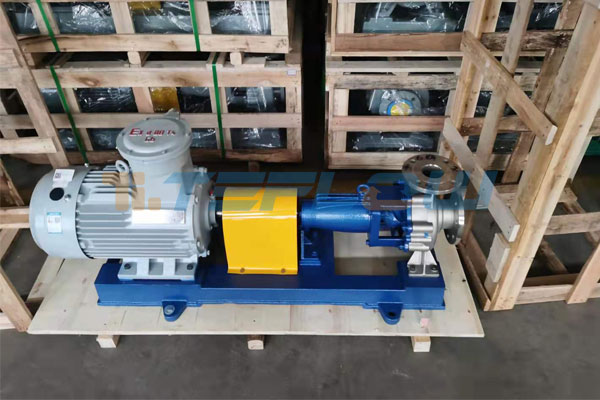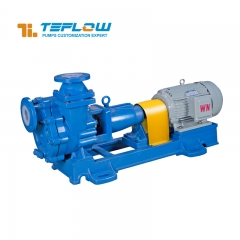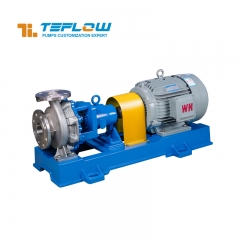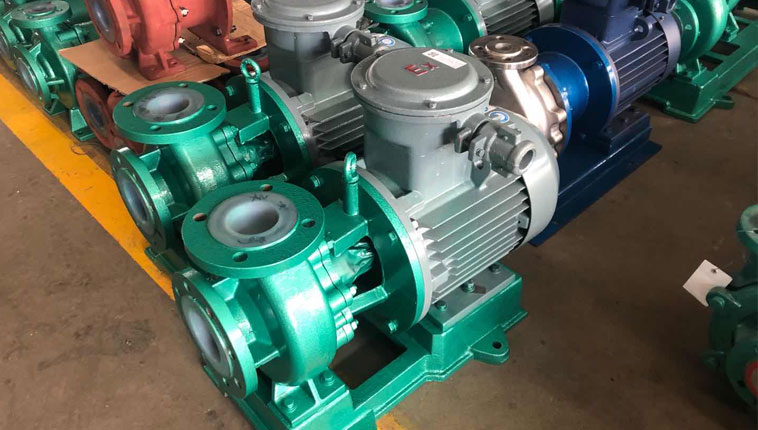The production process of lithium iron phosphate (LiFePO4) involves the generation of waste water containing various harmful substances, requiring appropriate treatment and conveyance. This article discusses the selection and optimization of pumps suitable for conveying waste water in the lithium iron phosphate preparation process, ensuring efficient and safe waste water treatment.
Lithium iron phosphate (LiFePO4) is an important cathode material for lithium-ion batteries, widely used in electric vehicles, energy storage systems, and portable electronic devices. However, the production process of lithium iron phosphate generates significant amounts of waste water, containing organic compounds, heavy metal ions, and acidic substances. Therefore, proper treatment and conveyance of waste water are necessary to ensure environmental protection and workplace safety.
Selection of Suitable Pumps: Before selecting pumps suitable for conveying waste water in the lithium iron phosphate preparation process, several key factors need to be considered:
Corrosion resistance: Waste water from lithium iron phosphate production typically has high acidity and contains corrosive substances such as sulfuric acid and phosphoric acid. Therefore, it is crucial to choose pumps made of acid-resistant materials.
Clog resistance: Waste water may contain solid particles, suspended solids, and particulate sediments. Selecting pumps with good clog resistance can reduce pump failures and maintenance requirements.
Conveying capacity: The pump's flow rate and head should meet the requirements of waste water conveyance. Factors such as waste water generation, conveyance distance, and required conveying pressure should be considered.
Energy efficiency: Choose pumps that offer high efficiency-to-energy consumption ratios to reduce energy consumption and operating costs.
Based on these factors, centrifugal pumps and diaphragm pumps are two common pump types suitable for conveying waste water in lithium iron phosphate preparation.
Centrifugal Pumps: Centrifugal pumps are commonly used pump types suitable for waste water conveyance. They generate centrifugal force through rotating impellers to transport liquids from the pump's inlet to the outlet.
Centrifugal pumps have the following advantages:
Strong corrosion resistance: Centrifugal pumps can be made of acid-resistant materials such as stainless steel or special alloys to withstand the corrosive nature of waste water in lithium iron phosphate production.
High conveying capacity: Centrifugal pumps have high flow rates and heads, meeting the requirements for waste water conveyance. Depending on specific process requirements, single-stage or multi-stage centrifugal pumps can be chosen.
Good clog resistance: Centrifugal pumps are designed with a large particle passage capacity, enabling them to handle suspensions and particulate sediments in waste water, reducing pump clogging issues.
High efficiency and energy savings: Modern centrifugal pumps employ advanced design and fluid dynamics technologies, providing high efficiency and energy consumption ratios, reducing energy consumption and operational costs.
Diaphragm Pumps: Diaphragm pumps are special positive displacement pumps that use diaphragms to convey liquids. They have the following advantages:
Strong corrosion resistance: Diaphragm pumps are typically made of corrosion-resistant materials such as fluoroplastics and polypropylene, capable of withstanding the corrosive nature of waste water in lithium iron phosphate production.
Good clog resistance: Diaphragm pumps have spacious and smooth pumping chambers, enabling them to transport waste water containing solid particles without easily clogging.
Safety and reliability: Diaphragm pumps employ a double diaphragm structure, providing self-priming and dry-run capabilities, ensuring pump integrity and preventing leaks even in case of interruption or stoppage of the conveyed medium.
Wide adaptability: Diaphragm pumps are suitable for various process requirements, capable of conveying waste water with different concentrations and temperatures, offering high flexibility and adaptability.

Proper selection and optimization of pumps for conveying waste water in the lithium iron phosphate preparation process are crucial for efficient waste water treatment. The selection process should consider conveying capacity, corrosion resistance, clog resistance, and stability. By understanding the process, consulting manufacturers, conducting experiments and field tests, and performing comprehensive evaluations and comparisons, an optimized pump selection can be achieved, improving the efficiency and filtration performance of the lithium iron phosphate preparation process.
In the future, with advancing technology and increasing environmental requirements, pump designs and material selections will continue to be optimized to meet higher efficiency and environmental standards in lithium iron phosphate production. Additionally, the application of intelligent control systems will further enhance pump operation efficiency and automation, realizing smarter and sustainable operations of the lithium iron phosphate preparation process.





 +86 18130251359
+86 18130251359 teflowpumps@tlpumps.com
teflowpumps@tlpumps.com











 +86+0563-5093318
+86+0563-5093318
